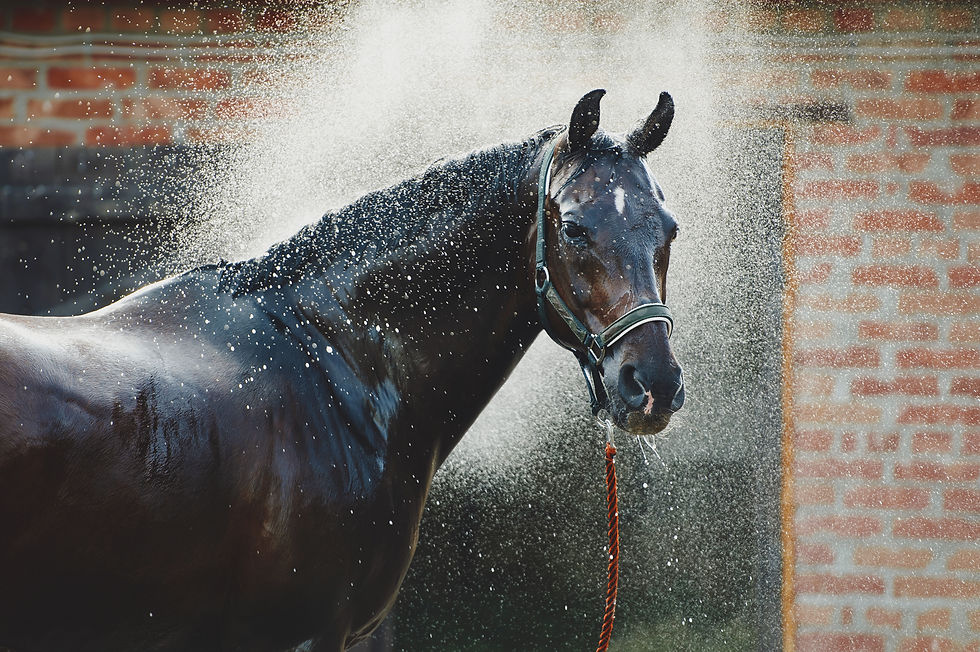How do I prevent or treat common skin conditions in horses, such as rain rot or scratches?
- Apr 9, 2023
- 3 min read
Updated: Oct 10, 2024
Rain rot and scratches are two common skin conditions in horses, both caused by bacterial or fungal infections.
Rain rot, also known as rain scald or dermatophilosis, is a bacterial skin infection that occurs when horses are exposed to wet conditions for prolonged periods of time. The bacteria, dermatophilus congolensis, lives on the skin of horses and thrives in wet, humid environments. Symptoms of rain rot include scabby, crusty lesions on the horse's back, neck, and rump, as well as hair loss and discomfort.
Scratches, also known as pastern dermatitis, greasy heel or mud fever, is a bacterial or fungal infection that affects the skin around the horse's lower legs and pasterns. It can occur when horses are exposed to wet, muddy conditions or when the skin is irritated by things like dirt, sand, grass seeds or bedding. Scratches often start as scabby, crusty lesions and can progress to open sores, causing pain and lameness.
Both rain rot and scratches can be uncomfortable for horses and can lead to secondary infections if left untreated. It's important to take steps to prevent these skin conditions and to treat promptly if you suspect your horse may be affected. Zinc, which supports immune function, is often recommended as a supplement or topical treatment for rain rot, scratches, and other skin conditions. Zinc has been shown to have antimicrobial and anti-inflammatory properties, which can help reduce the severity and duration of skin infections. We have examples of zinc-based products below as both topical treatments and oral supplements.

Keeping your horse clean can help prevent bacterial and fungal skin infections. It's very helpful to dry their legs to help avoid mud fever/greasy heel.
Keep your horse clean and dry: Regular grooming and cleaning can help prevent these skin conditions. Dry your horse thoroughly after bathing or riding in wet conditions.
Avoid sharing grooming tools: Sharing grooming tools between horses can spread infections, so use separate tools for each horse or disinfect them between uses. You can spray your grooming tools with listerine, or a dilution of napisan in a spray bottle.
Treat early: If you notice any signs of skin infection, such as scabs, bumps, or hair loss, treat it early to prevent it from spreading.
Use medicated shampoos. You could try Go Ahead Shampoo, which contains zinc. Zinc preparations can be used to soothe irritated or inflamed skin, and may help speed up the healing process of wounds and other skin conditions.
5. Keep the affected area clean and dry: our Good to Go Hoof Powder, which is primarily a treatment for thrush, will also work very well for greasy heel - and it is so easy to apply. Simply sprinkle on, and it will help to keep the area dry, as well as fighting bacterial and fungal infections.
6. Tuff Rock Poultice is another topical application that is easy to use, natural and helps protect horse's skin against common skin conditions.
7. Consider dietary changes: In some cases, dietary changes may be recommended to boost your horse's immune system and help prevent further infections. Zinc is an essential mineral that plays a role in many bodily functions, including wound healing and immune function. Zinc is also important for maintaining healthy skin, hair, and hooves. Sound Advice Trace Mix contains optimal amounts of zinc and can help prevent with skin conditions.
For best results you could try a combination of these treatments. While each product alone may be helpful for horses with skin conditions, it's not a substitute for proper hygiene and management practices to prevent skin infections from occurring in the first place. Try to keep your horses dry and out of muddy conditions as much as possible.




Comments